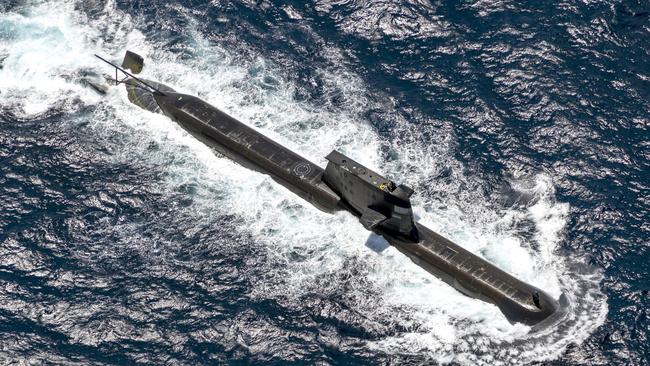Christopher Pyne: What the AUKUS pact means for Australia cannot be underestimated
Building nuclear submarines in SA is one thing. But the seismic impact of the AUKUS pact for all of Australia cannot be underestimated, Christopher Pyne says.
Opinion
Don't miss out on the headlines from Opinion. Followed categories will be added to My News.
The new strategic pact between Australia, the United Kingdom and the United States (AUKUS) announced on September 9 has enormous implications for our nation’s military capabilities and its defence industry, but it also has profound meaning for the regional power balance in the Indo Pacific.
For Australia, AUKUS is the most important foreign and defence policy development since the 1950s when the Menzies government signed the Australia New Zealand and United States Treaty (ANZUS), and also normalised our relationship with Japan leading to the economic boom that still affects the Australian economy and standard of living today.
AUKUS is also one of the most important moments for the United States in its relationship with the Indo Pacific.
It will shape US foreign and defence policy toward the Indo Pacific for the duration of the present China challenge to US’s power in our region.
The AUKUS strategic pact will include co-operation and sharing of technology in the areas of artificial intelligence, critical minerals, hypersonics and cybersecurity.
But the sharing of nuclear powered propulsion technology with Australia should not be misunderstood – this is only the second time in 63 years that the US has been prepared to share its nuclear propulsion technology with anyone.
The first time was with the other partner in AUKUS, the UK.
There are only six countries in the world that are known to have nuclear-powered submarines – Russia, the US, the UK, China, India and France.

Brazil and South Korea are working on acquiring the capability in the future. Australia is joining an exclusive world club. The military capability that it will provide for the Australian Navy is world-class. Operating in tandem with the Collins-class conventional submarine, it will make Australia a significant military force in the Indo Pacific.
As one of my defence industry friends said to me on September 9, “this is seismic”.
In the rush to digest what AUKUS means for the defence industry, particularly the building of submarines at Osborne in the wake of the cancellation of the Naval Group contract, the geostrategic dimension of the agreement should not be lost.
It is a truly profound moment.
The Economist magazine put the announcement of the AUKUS agreement in the same pantheon of post-World War II events as the Suez Crisis in 1956, President Nixon recognising China in 1972 and the fall of the Berlin Wall and the effective end of the Cold War in 1989.
Following the withdrawal of troops from Afghanistan, the United States’ allies could be forgiven for questioning the country’s commitment to its friends.
I don’t share that view. The US committed to a mission in Afghanistan, achieved it with a coalition of countries. including Australia, and stayed there for 20 years.
It’s hard to see that as “cutting and running”. Although the haste of the exit left many wondering.
AUKUS removes any doubt that the US is committed to its friends and allies in the Indo Pacific.
At a time when Australia’s economy and trade is being put under pressure by China, the US has made a bold statement of support for Australia.
At the same time, the UK – long engaged with the European Union and now free, since Brexit, to pursue its own interests entirely separate from Europe – has put context and meaning to its newly outward looking global agenda.
The Biden administration and Morrison government have largely brought this about.
There is no doubt that the development of AUKUS is part of an overall US strategy to genuinely fulfil the promise of the Obama administration to “pivot” to the Indo Pacific.
The Morrison government has orchestrated both that outcome and also encouraged the Biden administration and its Secretary of State, Antony Blinken, to put real weight into “the Quad”, the quadrilateral of Japan, Australia, India and the United States that had its first face-to-face meeting of national leaders in Washington DC last week.
All of this is happening in an environment of Chinese power politics in the Indo Pacific.
China has pressed its claims in the South China Sea and militarised previously unused shoals, reefs and islands there. President Xi Jinping has increased his rhetoric around the reunification of Taiwan with mainland China.
There has been real speculation about China placing a naval base in Cambodia in the heart of ASEAN (the Association of Southeast Asian Nations).
China carries out air movements in Taiwanese air space almost daily. Chinese naval incursions occur in Taiwanese waters less frequently but often enough to be noticeable.
Australia has weathered the economic pressure exerted by China in the past year and a half but more than that, we have strengthened our hand with our friends and allies, many of whom have looked to see how Australia reacted and what it might mean for their own national interests.
The message to them is very clear – we will stand up for our values-based foreign policy and national interests and we will engage with others who share those values.
AUKUS is the most significant move in this high-stakes chess game of international foreign and defence policy.
It is a seminal moment that will be felt for decades to come.





